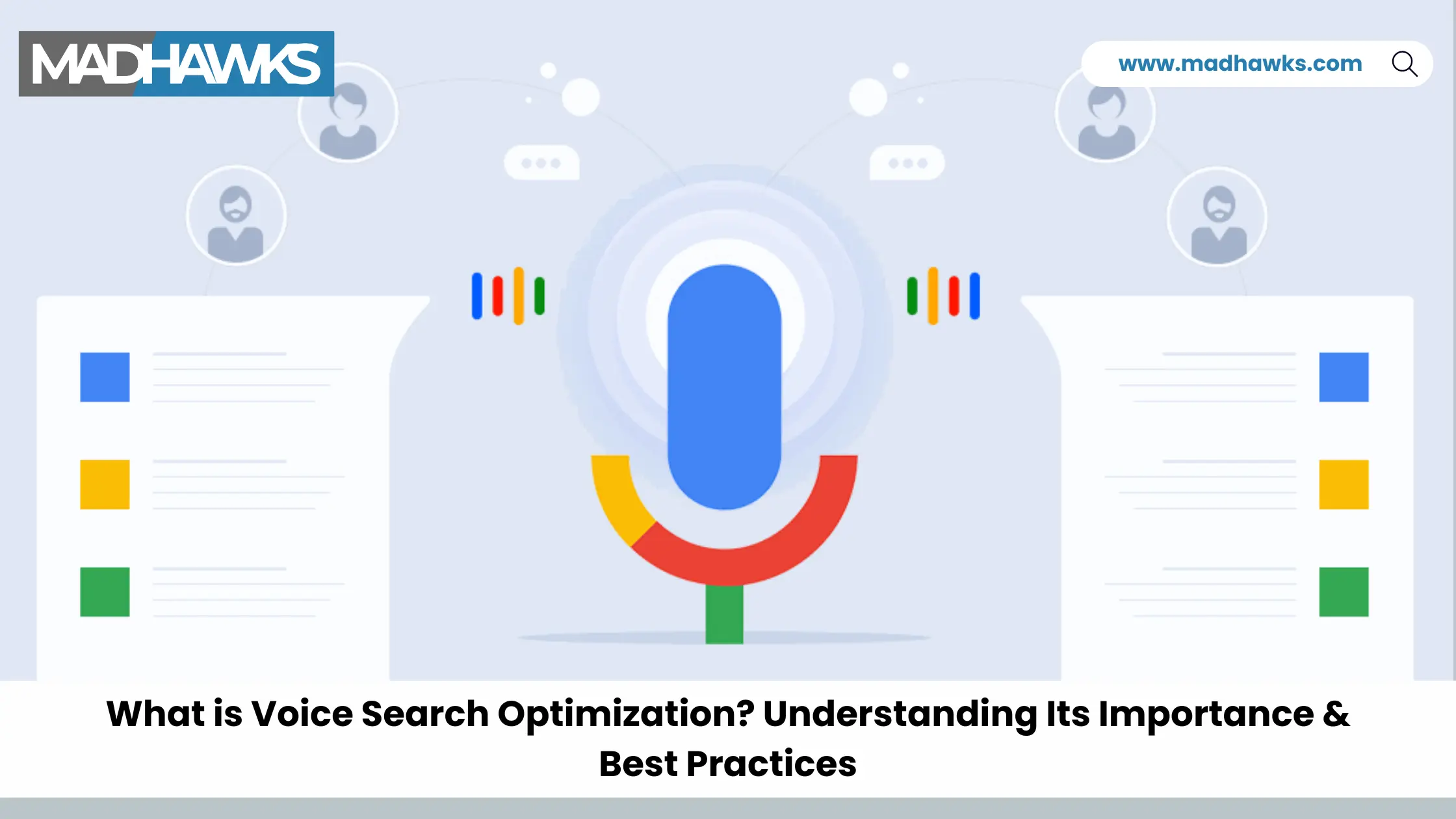Over 4.2 billion voice assistant devices are in use globally and this number is expected to rise to 8.4 billion by the end of 2024. With more and more people using voice search to find information, voice search optimization has become an important aspect for website owners. Let’s explore it further through this article!
Over 71% of consumers prefer voice search over typed search and many have already started using it. With the continuously increasing popularity of voice search, a new door of opportunity opens up for website owners who are trying to make it to the top of search results. Usually, typed queries display different results from voice search queries. This is because consumers use different tones and phrase their words differently when conducting voice searches.
By doing proper voice search optimization, websites can make their content read aloud by voice assistants even if they are not ranked #1 in typed search results. Voice search is expected to become even more significant in 2024 and it can also help improve the overall SEO and visibility of a website. To understand how you can integrate voice search into your SEO strategies for success, continue reading:
What is Voice Search Optimization?
Voice search optimization is the process of improving your site’s online visibility to appear in voice search results. The goal here is to get read aloud by voice assistants like Amazon’s Alexa, Google Assistant, Apple’s Siri, etc when users perform a voice search. Although voice search can also be made on Google and other search engines by tapping on the ‘mic’ icon in the search bar, this type of voice search displays the same results as text-based search or typed search.
However, voice searches made through dedicated voice assistants may have different results. It happens because there is some difference between how users type their queries and how they phrase them when asking directly with their voice. Users can talk to voice assistants just like they talk to real people, but that is not the case with search engines. Voice search queries are usually longer, conversational, and more specific. To appear in voice search results, you have to optimize your content for such queries.
Why is Voice Search Optimization Important?
As per Google, 20% of all mobile searches are done by voice, and research shows that the number of voice searchers is expected to grow even more in the coming years. Therefore, optimizing your website content for voice search can bring numerous benefits. You can reach more audiences by optimizing your website for voice search rather than just text-based search alone. By targeting long-tail and conversational keywords in your content, you can make your content get read aloud by voice assistants for relevant voice search queries.
Tips to Improve Voice Search Optimization For Your Website
Voice search is said to be the future of online search. More and more people are now conducting voice searches with voice assistants, car speakers, and smartphones. This shows the utmost potential that voice search holds in the field of online search. You can expand your online visibility by optimizing your content for voice search instead of just focusing on text-based or typed search. To succeed in voice search optimization and improve your overall SEO, here are some tips you can follow:
1. Focus on Longer and Conversational Keywords
Keyword research is the foundation of any SEO strategy and the same goes for voice search optimization as well. Although short-tail keywords still remain relevant, it’s time to focus equally on long-tail and conversational keywords as well. When conducting keyword research for voice search optimization, you can focus on long-tail, question, and conversational keywords.
- Long-tail keywords usually have low search volumes but they are also less competitive, which gives you a great opportunity to appear for more specific search queries.
- Question keywords that include terms like ‘what,’ ‘how,’ ‘where,’ ‘when,’ ‘who,’ etc, are also more likely to be used when people conduct voice searches.
- Conversational keywords are also long-tail keywords that reflect the natural tone in which humans converse.
- Although these three categories of keywords can even overlap for several types of search queries, you should still focus on each of them in order to make the most out of your voice search optimization efforts.
2. Optimize Your Website Content
It’s not that you need to write content from scratch to optimize your website for voice search. If you already have content around the keywords that you want to target, you can improve and optimize the existing content. For example, if you have a blog post that targets short-tail keywords like ‘search engine optimization,’ you can optimize it for keywords like ‘What is search engine optimization’ or ‘tell me about search engine optimization’ instead of writing a new post for these keywords.
You can start by conducting a content audit, which will give you an idea about your top-performing web pages that you can start from. Make sure that your content is of high quality. When a voice assistant reads your content aloud, it should sound like information coming from an authoritative source. Here are some best content practices to follow for voice search SEO optimization:
- Use natural language, especially in the section where you are targeting the long-tail or conversational keyword.
- The body content should always feel natural. Make sure that you incorporate keywords naturally at places like headings or tile tags so that when a voice assistant reads your content, it sounds natural and not keyword-stuffed.
- Write clear and concise answers to frequently asked questions if you have added them to your blog posts.
3. Focus on Technical SEO Aspects of Your Website
Technical SEO of your website plays a major role in the online visibility of your website. Technical elements like page speed, site architecture, etc, directly impact the user experience, which is one of the foremost ranking factors considered by search engines. In order to ensure good crawlability and indexability of your web pages, you must focus on the following technical SEO elements:
Mobile SEO: As most people conduct search on mobile devices today, it’s crucial that your website is mobile-friendly, i.e. optimized formobile screens. Many users use smartphones to conduct voice searches. If your website is not mobile-friendly, you might lose a large voice search ranking opportunity.
Page Speed: Your web pages should have a good loading speed. Pages with very slow speed often result in increased bounce rates, which further impact your site’s rankings. Search engines prioritize pages that have fast loading speed in order to ensure a good user experience.
Good Site Structure: Your website’s structure should be easy to understand and it should have a responsive design. Your site should respond well across different devices without hampering user experience.
HTTPS: HTTPS, the encrypted version of HTTP, has been a ranking factor for years now. Make sure that your website is HTTPS encrypted as this improves security for users, which is another positive factor impacting your website’s rankings.
4. Build Pages That Answer FAQs
Many websites have FAQ pages or sections, but only a few of them ensure proper formatting of these pages. You can add FAQ sections in your blog posts that answer relevant questions, which are frequently asked by users. You can find these questions under the ‘People also ask’ section in the SERPs. Including answers to these questions in your website content increases your chances of appearing in voice search results.
You can target the question and conversational keywords that we talked about earlier in this blog post. Just make sure that your answers are clear, natural, and concise, in order to make them get them in voice search results.
5. Use Schema Markup to Provide Context
Schema markup, also known as structured data, is a special type of code that search engines use to understand the context of your website content. By incorporating schema markup into your content, you can help search engines or voice assistants better understand the context of your web pages and read them for the most relevant voice search queries. You can use different types of schemas based on the type of your content and increase its chances of appearing in voice search results.
Make Your Content Appear in Voice Search Results with MadHawks
As we have already discussed, voice search is gaining more significance in 2024. To stay updated with the trend and benefit from it, it’s crucial to focus on voice search optimization and make your website appear in its results. The SEO team at MadHawks has good experience in optimizing websites for voice search and improving the overall SEO strategy of businesses. If you want to succeed in voice search optimization and make your website sound like an authoritative source of information, partner with MadHawks and streamline your strategies. For any further information, contact us today!
FAQs
1. How do you rank on voice search?
Ans. To rank on voice search, you will need to optimize your content for longer, more specific, and conversational keywords, and write your content in a natural tone.
2. What are the keywords for voice search?
Ans. For voice search optimization, you should majorly focus on the following three types of keywords:
- Long-tail keywords
- Question keywords
- Conversational keywords
3. How do I get my business listed on voice search?
Ans. To get your business listed on voice search, you will have to integrate your local SEO strategies with voice search optimization. Optimize your landing pages for keywords like ‘XYZ businesses near me’ or ‘which is the best XYZ store nearby,’ etc.
4. How is voice search different from text search?
Ans. Voice search refers to search queries made through voice assistants like Alexa, Siri, Google Assistant, etc. On the other hand, text search is the traditional type of search that you conduct by typing your query into search engines.
5. Why are Voice Search Queries on the Rise?
Ans. One of the most significant reasons behind the increasing popularity of voice search queries is their ease and convenience. Users can simply ask any query by speaking it instead of manually typing it in search engines.







